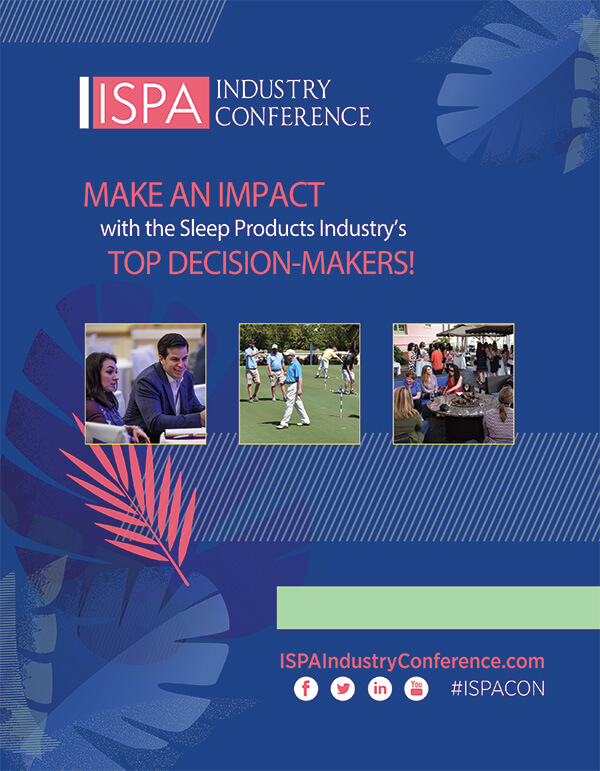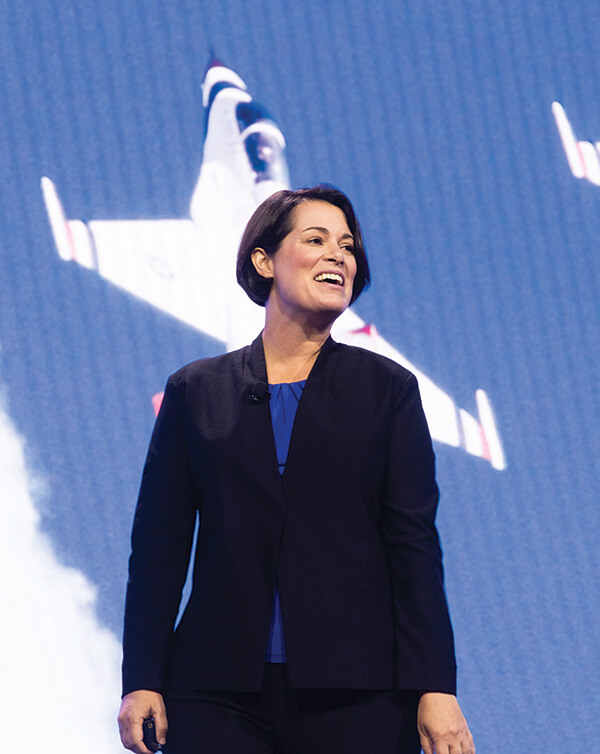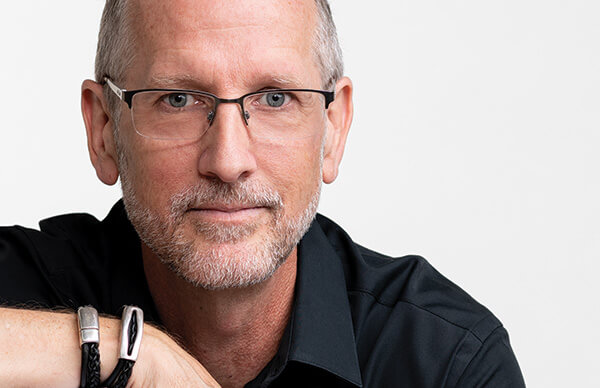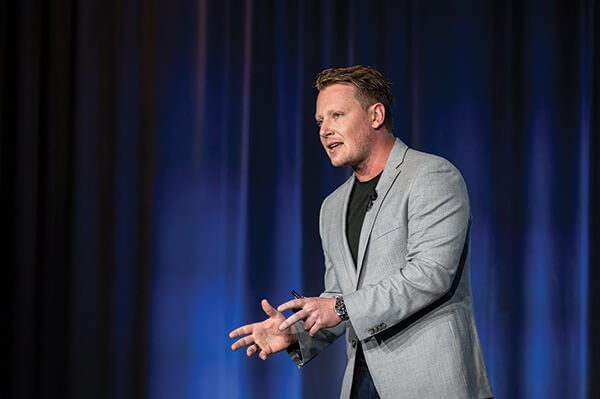Learn to compete in a rapidly changing marketplace at the ISPA Industry Conference.

Perhaps more than any other time in its history, the bedding industry is in the midst of a period of rapid change. Faced with an increasingly informed and demanding consumer, mattress manufacturers and retailers have been challenged to rethink the way they make and sell their products. This has led to a period of tremendous innovation, with manufacturers incorporating new technology and design advancements to create beds that meet the sleep needs of every type of consumer. And it has pushed retailers into a new era of selling, where digital tools take their marketing to the next level.
To compete, the mattress industry must maintain a forward-thinking approach that allows it to remain nimble and successful in a rapidly changing marketplace. That’s the message of the three keynote speakers set to address attendees at the ISPA Industry Conference, March 15-16, at the Vinoy Renaissance Resort & Golf Club in St. Petersburg, Florida.
Speakers Col. Nicole Malachowski, David Kepron and Eric Termuende will share insights on how to make smart decisions in a high-speed environment, how to remain relevant in a digital marketplace and how to be a leader in the new world of work.
The Mach 2 Mindset: Decision-Making in a High-Speed Environment

What does flying an F-15 fighter jet have to do with the way you run your business? More than you might think.
It involves high-speed decision-making in a chaotic environment. Sound familiar?
Col. Nichole Malachowski, USAF (Ret.), will share her experiences performing close air support and air-to-air combat and how the lessons she learned apply to the business world at the opening keynote at 9 a.m., Thursday, March 16. She will offer principles to keep any organization functioning smoothly, quickly and efficiently in times of calm and in times of turmoil.
Malachowski served as a mission ready fighter pilot in three operational F-15E fighter squadrons and has flown more than 188 combat hours in both Operation Deliberate Forge and Operation Iraqi Freedom. She served in combat as an F-15E flight commander, F-15E evaluator, instructor pilot and flight lead.
“Performing close air support or air-to-air combat in my F-15E, I knew that the unknown, chaotic environment of war would require on-the-spot, accurate decision-making — chaos is always expected,” Malachowski recalls. “Because of the speed and critical nature of our task, my team relied on effective communication and a clear delineation of responsibilities to win the battle.”
Maintaining top speed was crucial: When a pilot is flying at slow speed, the drag created by the aircraft is so great that acceleration requires an enormous amount of power. Just like with flying, “organizations must also get ahead of the power curve and minimize the drag that slows them down,” she says. “The organization that moves the fastest often realizes the most success.”
Her presentation will touch on themes of trust, teamwork, communication, sharing the workload and building a culture of speed. She will also address high-speed decision-making in a controlled environment and in an unexpected environment — something that the bedding industry is experiencing now as it “normalizes” after the pandemic.
One of Malachowski’s greatest distinctions is that she is also the first female Thunderbird pilot, which she will share in a segment titled “Thanks for Letting Me Borrow Your Jet.”
“It’s about how I joined the Thunderbirds,” she says. “I told them I was ready to go fly, and they said, ‘You don’t get to touch our jet until you get to know each and every one of us, our names, our spouses’ names, our hometowns and our hobbies. Further, you have to do a mini-internship with every single function on this team.’ And there were 125 people from 25 different career functions. So, I was turning wrenches with the crew chief, I was working in logistics, understanding the supply chain. … The point is that nothing of significance is ever accomplished alone. And the whole point of an association is that through the collective, we raise the whole group.”
Most of all, Malachowski understands the importance of a good night’s sleep — something she takes very seriously due to her chronic illness. Her military career ended prematurely, when she was medically retired due to a tick-borne illness.
While speed is one of a fighter aircraft’s greatest assets, the F-15E can’t turn well at Mach 2, which is twice the speed of sound. Malachowski relied on this knowledge as the physical and neurological effects of the illness placed her life and health in jeopardy. She discovered that she had to accept her new limitations and leverage her strengths, ultimately slowing down to change course.
Using the aviation concept of “corner velocity,” Malachowski will share how to quickly change course and reaccelerate in a new direction — in business and in life.
Remaining Relevant in a Digital Marketplace
The pace of change in retail has moved at lightning speed over the past decade, and having a robust digital presence is crucial to remain competitive.

David Kepron knows that well. Founder of Retail (r)Evolution and former vice president of global design strategies at Marriott International, Kepron has seen how the internet has changed the way companies do business across sectors. He says that while change is inevitable, it doesn’t follow a linear path. He will speak at 10:45 a.m., Thursday, March 16.
“We’re living at an exponential rate of change,” Kepron says. “Change has been happening in an evolutionary way if you look at it on a broad-spectrum timeline. But the key defining feature is that the rate of change is nonlinear — it’s exponential.”
Kepron says the lulls between moments of change are growing shorter and shorter, forcing us to become more nimble to adapt. And while people can create systems and engage in training to make their businesses more agile, the most successful companies will take an open-minded approach to stay relevant in a changing environment.
“I don’t think we’re all that good at adapting to change, and we become very rigid in the way we think,” he says. “The challenge is that (change) forces us into this paradigm of truly living within a fluid moment.”
That mindset will allow retailers to remain relevant to a more digitally focused consumer who expects more transparency, communication and experiential interactions with brands.
“Their viewpoint into how they want to communicate — and what the relationship between a brand and themselves means — is very different,” Kepron says. “They’re in the world of fluid experience. They’re perfectly happy with the fact that things don’t live very long in their life.”
Kepron says to compete in today’s marketplace for the new generation of consumers, relying on tradition and how things have always been done no longer works. And that includes your approach to responding to change.
“If your strategy is to keep building a link and a bridge to connect to your customer, the problem is that for every link you build, they’ve moved three farther away,” he says. “And then for the next one you build, they’ve moved seven farther away. So, if you live in the traditional paradigm of incremental change — in capturing your customer and their interest, and of course their share of wallet — then you’re perpetually behind.”
Kepron says that while the exponential rate of change happening in retail may seem daunting, it also presents retailers with an opportunity to build stronger, lasting relationships with customers. The key is remaining open to adapting your approach to meet their needs.
“Reliance on tradition and traditional approaches to doing things are no longer relevant in the context of a group of experience-seeking consumers who really want a different kind of relationship, one that’s not based on the one-way flow of information from the brand to the consumer,” he says. “That fundamentally changes the way you approach your business and customers. And to the extent that you can, within whatever your business is, allow them to write themselves into the narrative of experience, you’ll have a win.”
Blueprint to the Future: Leading in a New World of Work
If the pandemic has taught us anything, it’s that we can’t predict — or control — the future. What we can control is how we prepare for what’s next, no matter what that may be.

That’s one of the biggest things bestselling author and workplace culture expert Eric Termuende learned over the past three years and will be sharing at the closing keynote at 3 p.m., Thursday, March 16.
“Many of us are struggling to grasp, in a world that’s changing faster than it ever has before, what tomorrow is going to look like,” he says. “So, the conversation that I’m bringing to the group is not necessarily what the future of work is going to look like. It’s more important that we talk about how we get to a future that’s impossible to predict.”
After co-founding his first company, Termuende began researching what makes a great workplace. That research eventually became his bestselling book, “Rethink Work: Finding & Keeping the Right Talent.” Since then, Termuende has worked as a speaker and workplace culture expert, presenting to leaders across a variety of industries.
Termuende says the most successful leaders he encounters tend to do three things with their teams. The first is build a deep sense of trust. Then they find a formula or framework that reduces friction — whether that’s relationship-, innovation- or systems-based friction. Once those first two goals are achieved, the third step is to create a meaningful, low-risk culture of experimentation.
“If we were to build trust to remove friction and create a culture of experimentation, the idea is that regardless of what the future of work looks like, we’ll be able to build an incredible team that can get there together — and have more fun doing it,” Termuende says.
With the unemployment rate as low as it is now, he says there are fewer quality potential employees available. And thus, the top candidates have the luxury of choosing to work for a company that offers the type of culture that appeals to them.
“If we don’t put these practices in place today, talent — as mobile as it is, and more mobile than it’s ever been before — will see opportunities, teams and leadership in other organizations or in other industries that they’ll find quite attractive,” he says.
Taking his three-pronged approach to cultivating a culture of trust and experimentation will allow companies to build a solid foundation that will help them meet whatever challenges or opportunities the future holds. And the key to that is creating a workplace that not only attracts the best employees, but also keeps them there.
“Whether it’s forestry or agriculture or bedding,” he says, “my true belief is that if we can create incredible teams, the talent shortage that everyone is faced with across the country right now is not something that we truly have to worry about.”




